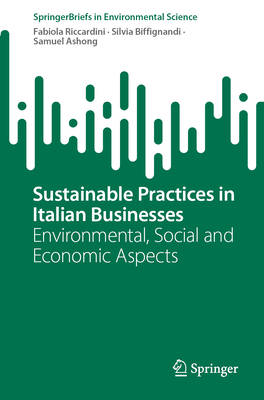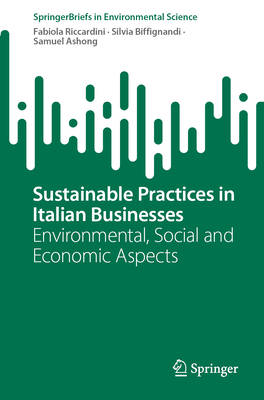
- Afhalen na 1 uur in een winkel met voorraad
- Gratis thuislevering in België vanaf € 30
- Ruim aanbod met 7 miljoen producten
- Afhalen na 1 uur in een winkel met voorraad
- Gratis thuislevering in België vanaf € 30
- Ruim aanbod met 7 miljoen producten
Zoeken
Sustainable Practices in Italian Businesses
Environmental, Social and Economic Aspects
Fabiola Riccardini, Silvia Biffignandi, Samuel Ashong
€ 47,45
+ 94 punten
Omschrijving
This SpringerBrief describes the development and use of a synthetic indicator to assess different degrees of sustainability adoption by economic sector and businesses size. To make this analysis a theoretical framework which involves variables common to alternative frameworks (specifically ESG, GRI and Istat) is proposed. The empirical analysis focuses on the environmental, social and economic variables of the Italian businesses. In this analysis, all three pillars of sustainability - economic, environmental, and social - are considered.
The work begins with a review of business sustainability literature and a look into institutional frameworks for the development and measurement of the phenomena. Connections between businesses and the SDGs are examined and comparison of the classifications of sustainable activities defined by GRI and ESG international standards is used to define a framework to be adopted to analyse ISTAT Business Census. Selected indicator variables are aggregated with a synthetic indicator and the results are presented (this is a new proposal of a synthetic indicator useful for the type of data used and published by ISTAT - Italian National Statistical Institute), discussing pros and cons of using it. This study provides two important innovative contributions. The first one is about how to approach the theoretical framework of businesses sustainability at firms aggregated level. The basic idea to work on a set of variables common to different approaches is interesting from the interpretative point of view. The second one, is about the specific empirical analysis, i.e. the Italian businesses sustainability situation. The investigation based on this new theoretical classification/framework and the new proposed indicator provides some interesting substantive results.Specificaties
Betrokkenen
- Auteur(s):
- Uitgeverij:
Inhoud
- Aantal bladzijden:
- 153
- Taal:
- Engels
- Reeks:
Eigenschappen
- Productcode (EAN):
- 9783031281761
- Verschijningsdatum:
- 10/06/2023
- Uitvoering:
- Paperback
- Formaat:
- Trade paperback (VS)
- Afmetingen:
- 156 mm x 234 mm
- Gewicht:
- 240 g

Alleen bij Standaard Boekhandel
+ 94 punten op je klantenkaart van Standaard Boekhandel
Beoordelingen
We publiceren alleen reviews die voldoen aan de voorwaarden voor reviews. Bekijk onze voorwaarden voor reviews.











